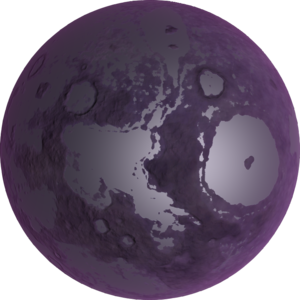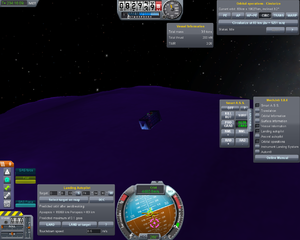Difference between revisions of "Eve"
(→Atmosphere) |
(→Atmosphere) |
||
| Line 57: | Line 57: | ||
== Atmosphere == | == Atmosphere == | ||
| − | The atmosphere begins ~100 KM. When you are inside the atmosphere, Eve appears indigo-blue during nighttime. | + | The atmosphere begins ~100 KM. When you are inside the atmosphere, Eve appears indigo-blue during nighttime. During twilight, the sky is green. |
== Natural Satellites == | == Natural Satellites == | ||
Revision as of 15:35, 21 September 2012
Eve is the second planet from Kerbol, and only available in versions 0.17 and higher. It is purple in appearance. It has one small asteroid moon called Gilly.
Eve is the closest planet to Kerbin and the easiest to reach, requiring the least Delta-V of any planet. Having a similar size to Kerbin gives it a large gravity well and a thick atmospheric composition makes landings easier.
Contents
Characteristics
- Equatorial Radius: 700 km
- Mass: 1.224E+23 kg
- Density: 85221 kg/m³
- Surface Gravity: 16.671305 m/s^2 or 1.7g
- Gravitational parameter: ... km³/s²
- Escape velocity from surface: ... m/s
- Sidereal Rotation Period: 22.5 hours; Rotation: ... degrees per hour, or ... m/s at the equator
- Solar Day: ... hours, or ... hours, ... seconds.
- Axial Tilt/Obliquity: 0.025° with respect to its orbital plane, 0° with respect to the ecliptic.(?)
- Synchronous Orbit altitude: ... km; Stationary Orbit velocity: ... m/s
Orbital Characteristics
- Semi-Major Axis: 9833000 km or ~0.0657295452 Astronomical Units (A.U.)
- Inclination: 2.1°
- Eccentricity: 0.01
- Velocity: 11,028 m/s
- Mean Anomaly at Epoch UT = ...
- Orbital Period: 1574.47 hours, or 65.6029 Earth days
- Sphere of influence: 85,109 km
Topography
Eve has large oceans of an unknown composition and large, flat continents with a few mountain peaks, and a large crater in the western hemisphere.
Atmosphere
The atmosphere begins ~100 KM. When you are inside the atmosphere, Eve appears indigo-blue during nighttime. During twilight, the sky is green.
Natural Satellites
Eve's only natural satellite is the tiny asteroid Gilly which has been captured long ago.


